Ross Brawn: architect of F1's new generation on the future of GP racing
How do you deal with a surge in Formula 1 interest? Can racing be fully sustainable? Will we see more teams on the grid? Rob Widdows talks to Ross Brawn, F1’s motor sport managing director, about the season so far and the big issues to be tackled in the new era
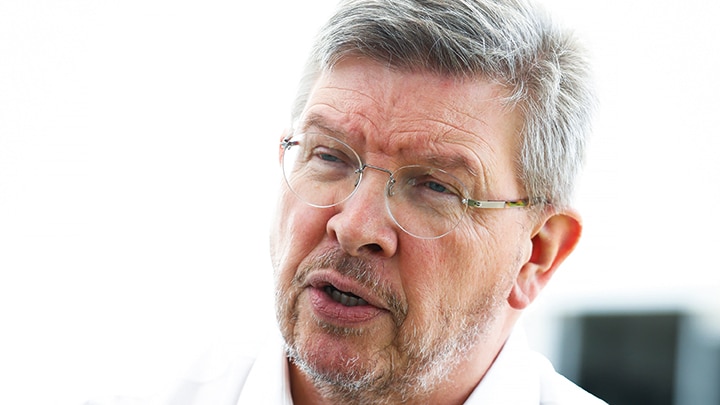
Ross Brawn was a leading member of the ‘dream team’ that guided Michael Schumacher to five Formula 1 titles at Ferrari and the brains behind world championships for Benetton, his own Brawn team and Jaguar in the World Sportscar Championship. In 2014 he took a sabbatical from the sport, returning in 2017 as motor sport managing director for Liberty Media’s Formula One Group.
After a stellar career in the pitlane he has played a major role in the evolution of grand prix racing, overseeing changes that have culminated in an unprecedented surge in the sport’s popularity. Known as a brilliant strategist and a creative technical director, Brawn was well-placed to guide new rights holder Liberty through the intricacies of a highly complex sport that many felt had become too predictable.
During the Monaco Grand Prix weekend, when the future of the race itself was under discussion, he took time out to talk about the F1 season so far, the changes to the technical regulations for 2022, and the future sustainability of a sport that continues to evolve in a fast-changing world.
He remains optimistic while acknowledging that there is still room for improvement.
The new regulations appear to have improved the racing. Are you satisfied that enough has been done and can we expect further tweaks?
RB: “First I will say that Adrian Newey [Red Bull’s chief technical officer], for whom I have huge respect, feels that the cars have gone in the wrong direction, saying they’re heavier and more complicated, and part of me agrees with him. I’d love to see little, lightweight, normally aspirated cars out there, but we’ve increased safety standards enormously with these cars and that comes with a price: extra weight, extra complexity.
“We have a strong initiative for sustainable net zero carbon fuels”
We always want to see a driver walk away from an accident.
“We have engines with a strong relevance to the future which is good for the manufacturers and which, in turn, means they are prepared to invest and compete for the best efficiency and most power. We also have a strong initiative for sustainable net zero carbon fuels. I understand the purist perspective, and a little bit of me says that would be fun, but we have to deliver cars that are safe and relevant to the future in order to keep all these partners involved in F1.
“We want cars to be raceable, so to have cars that can’t race in close proximity is not right. We have put raceable cars at the forefront of developing the new regulations, be it with aerodynamics or the complexity, all within a budget cap because we want close and fair competition with as many teams as possible. These factors are coming together nicely so, yes, I am pleased with the way it’s going.”
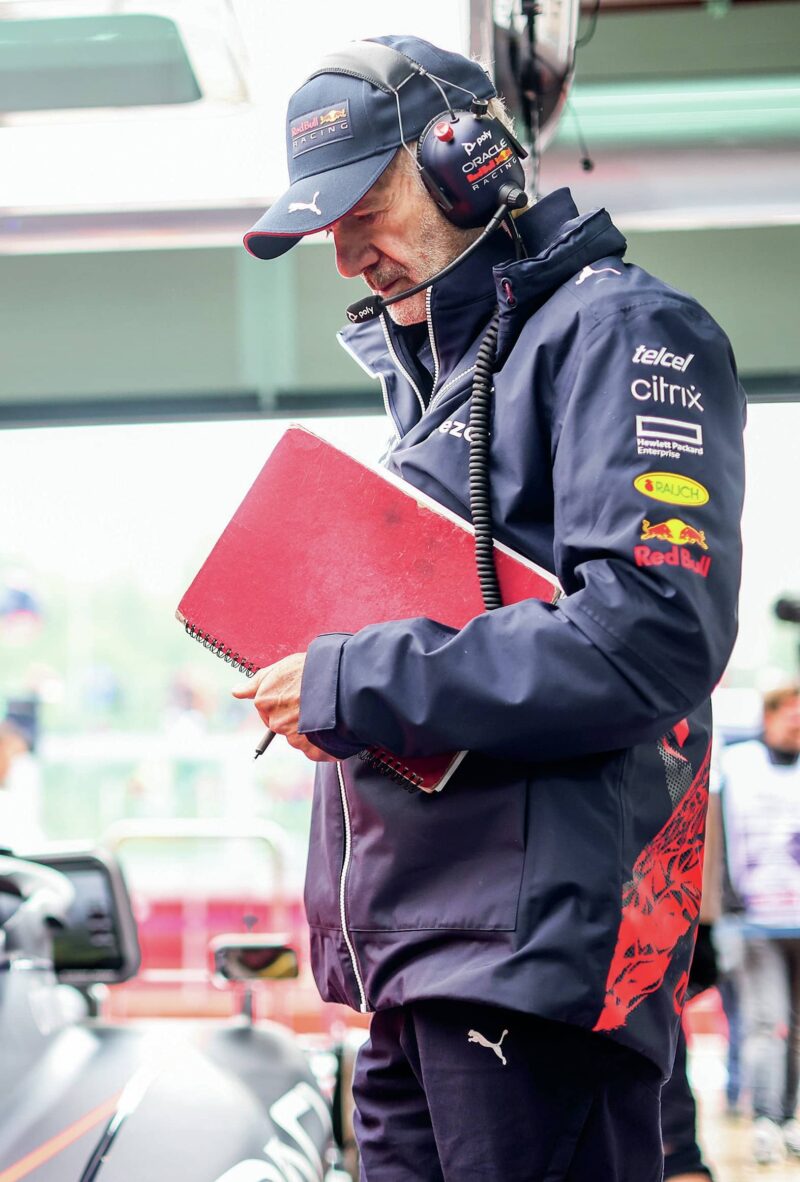
Red Bull’s Adrian Newey has criticised the new Formula 1 regulations
Is the drag reduction system with us for ever more or can we get to a car where overtaking is possible without that?
RB: “This is partly about the nature of existing tracks. We can’t expect the promoters to tear up their tracks and redesign them, so I think DRS is a necessary fixture. We carried out a ‘DRS experiment’, if you like, in Barcelona when we could see the challenges Verstappen had in overtaking when his wasn’t working. What we want is a situation where a driver following has to really work hard to get on the back of the car in front, get himself in the right position, and then DRS is the final stage of that. We don’t want it to be too easy.
A driver can’t just sail up to the back of another car without getting himself in the right position. So we will continue with DRS as a factor in overtaking until the cars evolve in a different direction. At the moment, there isn’t an alternative.”
How confident are you that F1 has a sustainable future when there is a real need to protect the environment and tackle climate change?
RB: “I believe it does, yes. With the intense competition and the large amounts that multinational corporations are prepared to invest in the right things, Formula 1 can be a banner for the future. The racing car, at an F1 event, is using less than 1% of the overall usage of fuel but it’s 100% of the message, and so to have the cars racing on fully sustainable fuels will be a massive message that there is a parallel solution. There are other forms of transportation, like aircraft, that will still need to use hydrocarbon-based fuel into the foreseeable future but if that hydrocarbon fuel can be made in a sustainable way then we have a net zero carbon route that isn’t adding carbon to the environment.
“There are two billion combustion engined vehicles on the planet.
They’re not going to disappear overnight, so the parallel solution is to have a net zero carbon fuel and that will have a massive impact. This is what Formula 1 is working on and it’s why companies like Porsche, Audi and others still believe they need to have an engagement with Formula 1 to demonstrate these alternative solutions.”
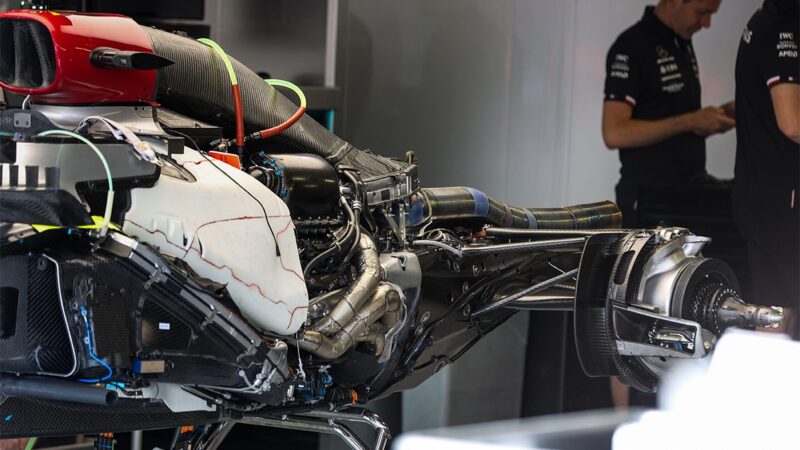
The aim is to get Formula 1 cars and even its air transport racing on sustainable fuel

F1-branded 757
The Volkswagen Group is sounding positive about coming to Formula 1. To make a commitment, how much influence would they want on the new engine regulations for 2026?
RB: “We’re already in a good position. The current engines are incredibly efficient. We started down a route, with the MGU-H, where electrical energy is recovered from the turbocharger and this was thought to be the direction for the future. This MGU-H technology, however, has not spread into a road car application so it has become a little bit of a redundant technology. What’s become clear is that new manufacturers coming to F1 don’t have an interest in building engines that have that type of recovery. It has no relevance for them. Getting rid of the MGU-H, therefore, is a key point and that’s a sacrifice that the existing manufacturers are prepared to make in order to move forward with the overall technology in Formula 1. This is a key aspect for Porsche, Audi or any other manufacturer that wants to come into the sport. The engines need to be more aligned with what they may be using in the future and sustainable fuel is another big necessity which is already supported by all the current teams and manufacturers.
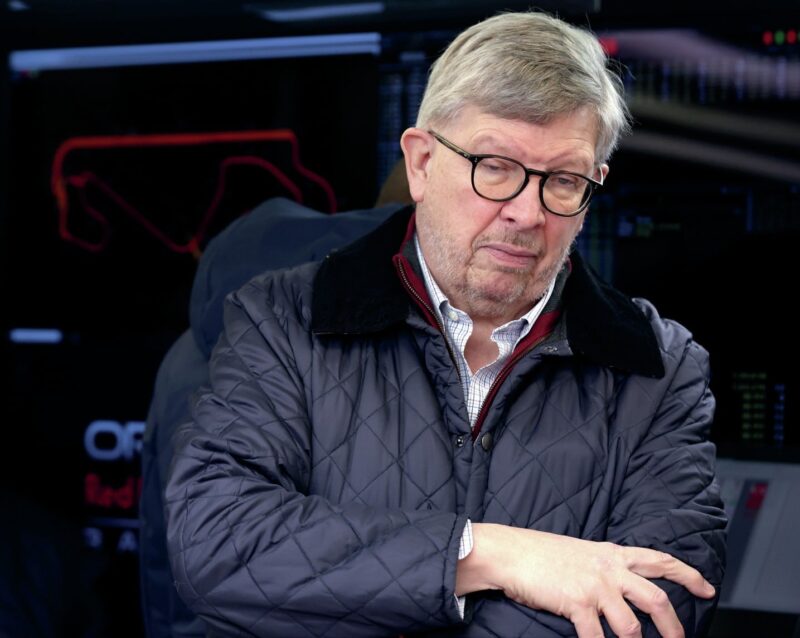
Ross Brawn at F1 testing at Barcelona in February – a track that caused some concern in May due to “unacceptable” traffic conditions at a sold-out Spanish Grand Prix
“Starting again, with a new engine, enables us to use the lessons learnt from the cost cap on the cars on the new engine as well. The new engine will be designed and developed under far greater economic controls and restraints, which puts a lid on how much resource the manufacturers can pour into it. So it will be more of a realworld situation for a sport that didn’t previously have those boundaries. You could never answer the question of ‘how much does it cost to do Formula 1?’ because there were no limits. Now there will be. They can spend this much on the team, this on the engine, and no competitors will be spending more than that. It’s a vital part of the way forward.”
How concerned are you that a team might have to miss a race to stay within the budget cap? Does this undermine the need to keep costs under control?
RB: “We’re going to have a whip-round. We’ve got a collection tin. We’re going to go and ask teams and spectators to donate to the Red Bull shortage fund. No, seriously, we’ve all met some
“The classic tracks need to make sure they keep up with the times” economic circumstances this year which the budget cap didn’t anticipate.
Governments didn’t anticipate it, nor did the big companies, and we didn’t see this coming. We had a mechanism in the cost cap to deal with normal inflationary issues but we didn’t factor in all the challenges we are facing at the moment. We will find a solution for genuine overspends created by this unusual inflationary pressure because it’s affecting all the teams. Some teams do have headroom in the budget cap but a lot of teams have a problem, not just Red Bull.
“We don’t want the cost cap to be mired in a situation where it can’t be maintained or controlled, so we need to find a solution so that the cost cap is respected. It’s right that Red Bull is making the noise because they can see the problem, we can all see the problem, and we’re not going to let the system break down. That’s not going to happen.”
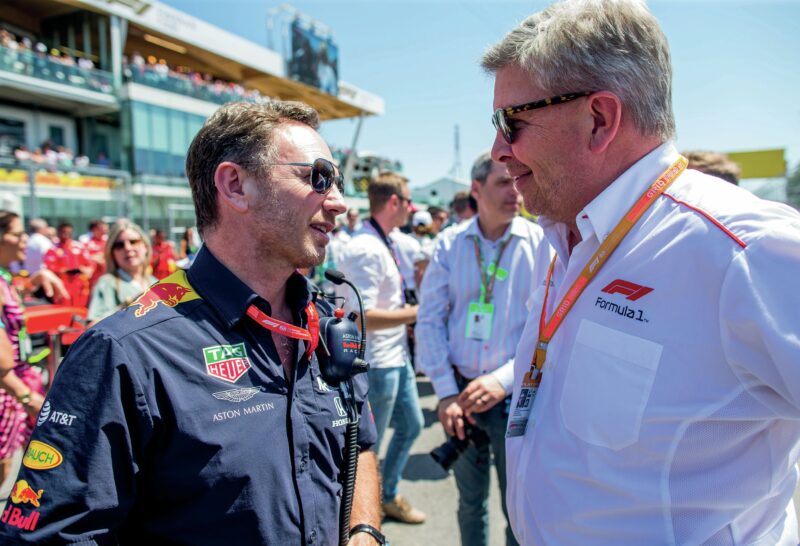
In discussion with Christian Horner, left, at the 2019 Canadian GP. No sign of the Drive To Survive cameras.
Would you like to see new names, like Andretti, join F1? There seems to be some resistance from existing teams.
RB: “We have a nice problem in that many of us remember when you couldn’t give a Formula 1 team away. I know what I sold my team for and I wish I still had it. Suddenly, thanks to all the things we’ve put in place, every team should be able to wash its face, and if they’re good at finding sponsors they’ll be making a profit.
“An additional team would raise the tide for all the boats in the long-term and that’s the question existing teams will be debating. Andretti is getting the highest profile at the moment but I promise you, there are half a dozen knocking at the door. The issue is what will new teams bring to the overall value of Formula 1? We don’t want to go back to the days when teams were falling away on a regular basis.
We want to maintain the stability we’ve had for the last five years or so. There’s no simple answer, but there has to be a compelling argument to have any additional team join the sport. We have a good collection of drivers, all the teams deserve to be here, we’re putting on a good show, so you could argue that 10 is a good number and there are no weak members. In the first four races of this year every team had scored a point and that’s not happened for decades. So do we want to upset that balance?”
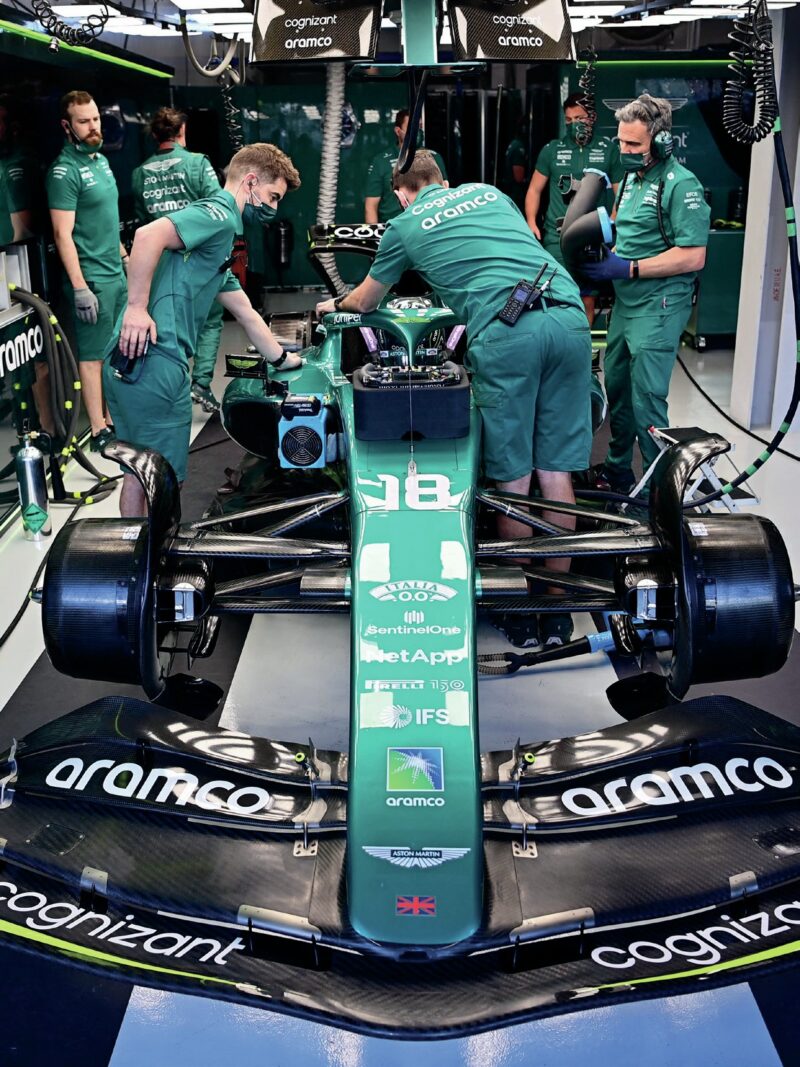
Aston Martin mechanics at new venue Jeddah
How many races is workable? Have we now reached the maximum that is both logistically possible and practical?
RB: “When I was at Mercedes we rotated the mechanics so that they could have time off. As a team you have to find the right balance between the pressures you put on your people and the number of people you employ. It’s down to the teams to find that equilibrium. When it comes to the number of races, we’re looking at what is right, what keeps our fans and spectators engaged and, commercially, the more races you have the more income you have.
“There are so many opportunities for teams to rotate staff and I’m a little jaundiced about the issue of overworking participants.
I think it’s for the teams to keep their people motivated. Yes, things have moved on, but when I was a Formula 1 mechanic I would be testing, racing and building the cars. These days there’s hardly any testing and the cars are built for them at the factory by technicians. I know the challenges but there are a lot of highly qualified people out there who want the opportunity to come into Formula 1 and I don’t think that reducing the number of races is the solution.”
As well as the new races, will you keep the sport’s classic and more traditional circuits on the calendar?
RB: “We have added races. We haven’t substituted them, but what we see is that some of the old venues are struggling.
In Barcelona we had challenges with traffic management and all sorts of other problems. The increase in popularity of Formula 1 has put more pressure on venues to stage an event that respects the fans. We want to keep the classic circuits but we want the promoters to come along for the new ride and give the fans a fun experience.
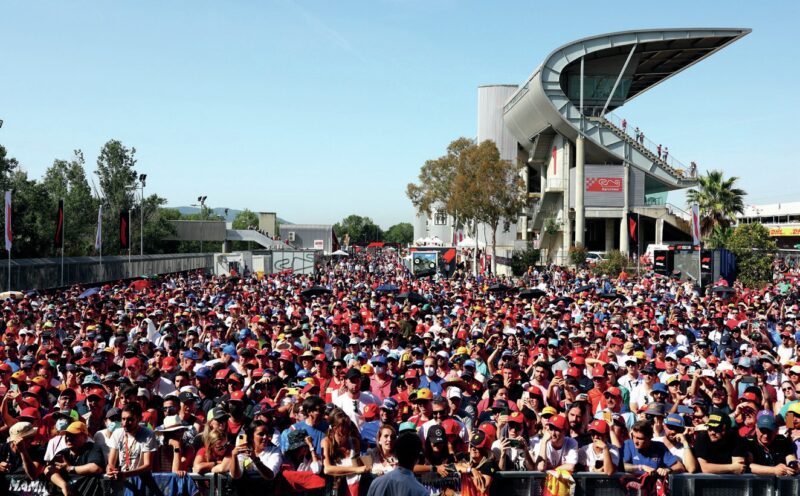
300,000 flocked to Barcelona
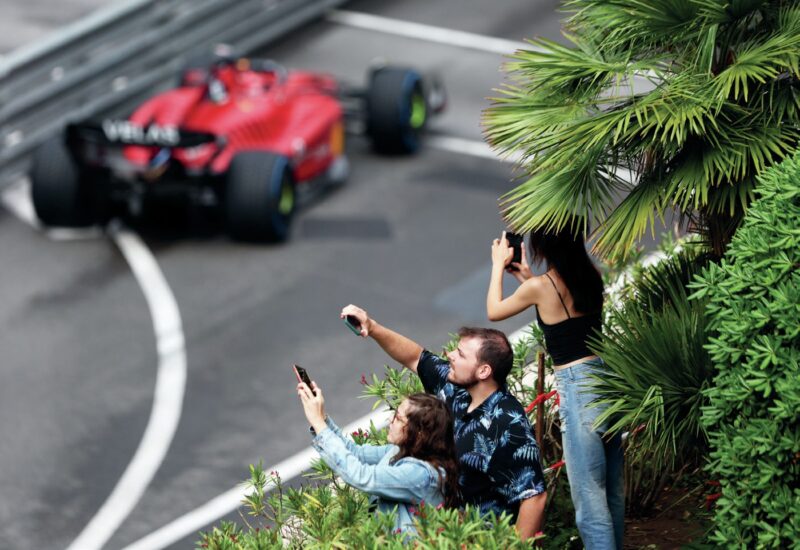
Fans at Monaco, but does the street circuit fit in with F1’s plans?
“We respect the classic circuits but we’ve been involved in developing these new cars and need to make sure they can race properly. This means the tracks must be the proper platform for the racing. The classic tracks need to make sure they keep up with the times. We don’t want to be making excuses for people having a poor experience when they come to a race. When something goes wrong it’s Formula 1 on the line, not the promoter. We can’t turn round and say, ‘Sorry but the promoter didn’t do a good job this weekend.’ We have to support the fans to give them the kind of engagement, the kind of experience, that they want and expect from a Formula 1 race weekend in this new era.”
